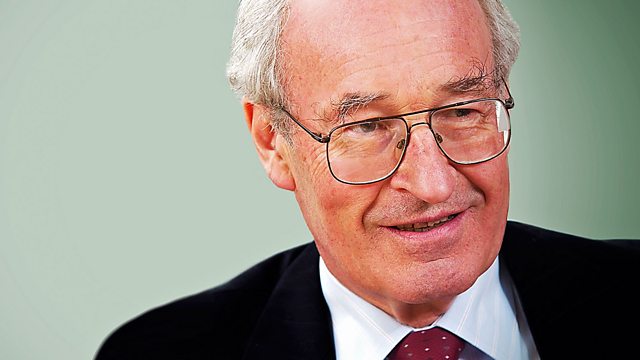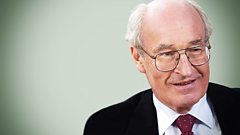Professor Sir Michael Rutter
Jim Al-Khalili talks to child psychiatrist Prof Sir Michael Rutter, who has been described as the most illustrious and influential psychiatric scientist of his generation.
Professor Sir Michael Rutter has been described as the most illustrious and influential psychiatric scientist of his generation. His international reputation has been achieved despite the fact that as a young doctor, he had no intention of becoming a researcher, nor interest in becoming a child psychiatrist. In fact he became a world leader as both.
His career has spanned more than five decades and is marked by a remarkable body of high-impact research and landmark studies. The theme running through all his work has been child development, on the subtle interplay between nature and nurture and on the factors that make the difference between a child flourishing, or floundering.
Evacuated during World War Two, to a Quaker family in the USA, Mike Rutter tells Jim Al-Khalili about the impact this move, aged seven, had on him. He describes the inspirational teachers who persuaded him that research and clinical work as a child and adolescent psychiatrist, was for him, and he admits that an early mentor insisted he mustn't receive any formal training in child psychiatry, something he hasn't received to this day!
He was awarded this country's first ever professorship in child psychiatry in 1973 and he's credited with founding the field of developmental psychopathology. This involves the study, over time, of normal and abnormal child development. He's currently Professor of Developmental Psychopathology at King's College, London and still a practicing child psychiatrist.
An early breakthrough was his discovery that autism, or infantile psychosis as it was then known, had a genetic basis, something barely suspected at the time.
Beautifully designed studies of populations over time followed, many of them landmark studies still cited today. They established the framework for studying and investigating mental illness in the community. The Isle of Wight Studies (1964-74) surveyed the mental health of children living on the island and for the first time in such research, children themselves were directly interviewed and questioned. Before this, Mike Rutter tells Jim, the assumption had been that what children thought and said didn't really matter.
In the 1970s, the Fifteen Thousand Hours study, delivered ground-breaking evidence about the combination of factors that affected the performance and behaviour of children in inner city secondary schools. Findings from this study were included by both the Labour and Conservative parties in their 1979 election manifestos.
"Maternal Deprivation Reassessed" was Mike Rutter's challenge to John Bowlby's hugely influential theory of maternal attachment. It was described as "a classic in the field of childcare" and it transformed the debate about the relationships that help babies to flourish.
His fascination with the underlying reasons why and how children vary in their ability to weather and cope with adversity, led to the growth of resilience science. For more than 40 years Mike Rutter, "the intellectual father", has led this field of study.
His name is particularly associated with "natural experiments" and one of the best known is the English Romanian Adoptees study that he set up in the early 1990s and still runs today. The children being followed are those rescued from the orphanages of Nicolai Ceausescu and adopted by families in this country. Because of the appalling conditions many of these babies and toddlers experienced in Romanian institutions, Professor Rutter understood that tracking and studying them as they grew up in loving homes here, would provide important insights into how early deprivation affects children's development.
Producer: Fiona Hill.
Last on
Clip
-
![]()
Romanian Adoptees: “A natural Experiment”
Duration: 02:03
Broadcasts
- Tue 3 Jun 2014 09:00����ý Radio 4
- Tue 3 Jun 2014 21:30����ý Radio 4 FM
Featured in...
![]()
Morning Commute
A selection of downloadable programmes, perfect for the morning commute
Sleep – the mystery state
Is your mind a machine?
Daniel Dennett thinks so. Here is what we learned from his Life Scientific.
Podcast
-
![]()
The Life Scientific
Professor Jim Al-Khalili talks to leading scientists about their life and work.





